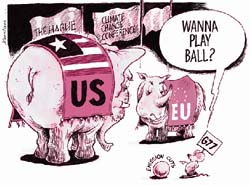What next?
 That was the question written across many tired and desperate faces after CoP-6 was suspended. The prospects for future agreement look particularly bleak in light of domestic us politics. If Republican George Bush becomes president, many fear that the chances of the us ever ratifying the convention will be lost forever. This view was promoted by the us administration, eager, as always, to get a deal that suits them through threats of what the us may or may not do if they don't get what they want. "I think it is fair to say that a pretty important opportunity was not cashed in,' Loy said of the eu 's rejection of the final proposal.
That was the question written across many tired and desperate faces after CoP-6 was suspended. The prospects for future agreement look particularly bleak in light of domestic us politics. If Republican George Bush becomes president, many fear that the chances of the us ever ratifying the convention will be lost forever. This view was promoted by the us administration, eager, as always, to get a deal that suits them through threats of what the us may or may not do if they don't get what they want. "I think it is fair to say that a pretty important opportunity was not cashed in,' Loy said of the eu 's rejection of the final proposal.
Some European groups have also, since then, started blaming the eu governments for passing up an opportunity which may not come by again. But was the opportunity worth grabbing, or was it a forced and worthless agreement like the Kyoto Protocol? Would they really prefer a bad deal to no deal? As Voynet said, "What is victory? Is it a hasty agreement under pressure or the ability to say no?'
So far, the us has relied on its ability to threaten the world with non-ratification to get what it wants. The eu has always been a weak opponent, giving in at the last minute (and not just in the climate negotiations
Related Content
- Order of the National Green Tribunal regarding discharge of wastewater by the municipality of Belpahar on a farmers land, Jharsuguda, Odisha, 15/05/2025
- Order of the National Green Tribunal regarding supply of safe and clean drinking water to areas affected by Guillain Barre Syndrome (GBS) disease, Pune, Maharashtra, 06/03/2025
- Order of the National Green Tribunal regarding constructions of residential apartments and discharge of waste in river Ganga, Haridwar, Uttarakhand, 10/01/2025
- Order of the National Green Tribunal regarding pollution of Ashtamudi lake, Kollam district, Kerala, 07/01/2025
- Order of the National Green Tribunal regarding encroachments and dumping of debris near eastern freeway, Wadala, Mumbai, Maharashtra, 27/11/2024
- Order of the National Green Tribunal regarding Tent City project in the riverbed of Ganga at Varanasi, Uttar Pradesh, 15/12/2023
